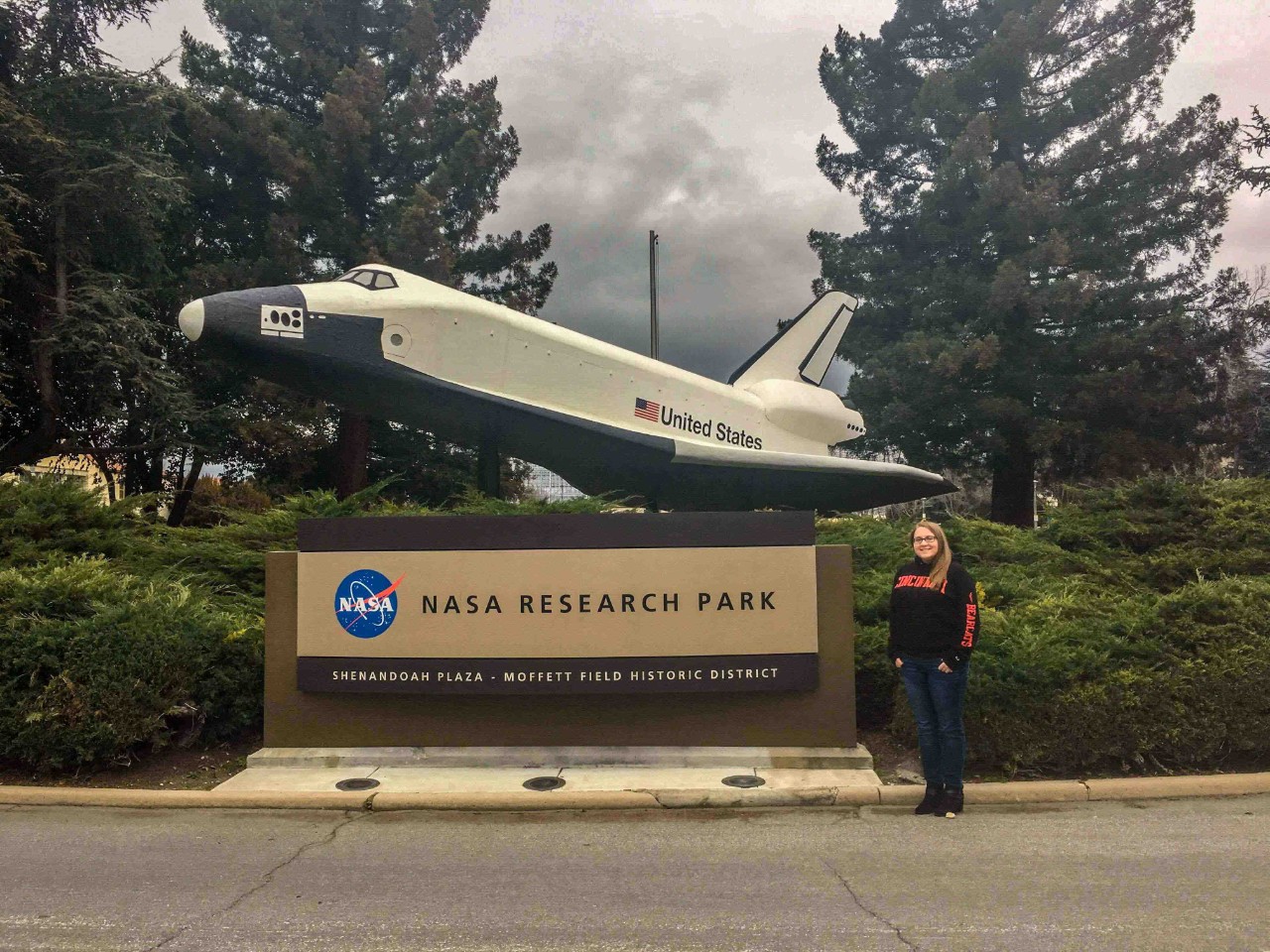
UC student studies cell behavior in space

UC biomedical engineering student Lindsey Lanzillotta poses in front of the Golden Gate Bridge. Lanzillotta is completing her final co-op rotations with NASA in the Bay Area. Photo/Provided
NASA’s Moon to Mars exploration campaign, unveiled at the end of 2017, hopes to prepare human missions to the Red Planet and the deeper solar system. If and when mankind makes a giant leap beyond the moon, keeping people healthy in space will be a top priority.
“In space exploration, you have people and machinery everywhere,” said Lindsey Lanzillotta, a fourth-year biomedical engineering student at the University of Cincinnati. “How are you going to keep these people healthy and treat them if they get hurt?”
Lanzillotta started her final cooperative education (co-op) rotation with NASA’s Ames Research Center in California’s Silicon Valley. She is helping design a pH sensor to understand human cells’ behavior in outer space, specifically when exposed to drug treatments in long-term space travel.
Lanzillotta’s work reflects UC’s innovation agenda, a platform of the university’s strategic direction, Next Lives Here.
Human cells are complicated and behave differently in extraterrestrial environments of varying gravitational forces and radiation, Lanzillotta said.
The pH sensor Lanzillotta is working on will be added to an existing cell culture system on the International Space Station. The sensor will monitor cells’ reactions to various drug treatments in space. Astronauts will inject the cells with different drugs, treatments that astronauts themselves may have to undergo. Scientists on the ground can observe how these cells react by measuring the acidity of the culture media.
Gone are the days of sending chimpanzees into space ahead of astronauts. With this pH sensor, engineers can provide invaluable insight into human health using cell cultures.

The International Space Station comprises scientific laboratories used to learn more about humans in space. UC student Lindsey Lanzillotta is working on a pH sensor that will be added to an existing cell culture system in the station. Photo/NASA
“You can monitor the cells’ wellbeing and how they are affected by treatments without taking them out and handling them,” Lanzillotta said. “We’re basically trying to identify the best drugs and treatments, so these astronauts can stay healthy on really long journeys in space.”
Lanzillotta’s opportunity with NASA stemmed from her co-op experience at UC. She spent her first two co-op rotations in UC professor Michael Tranter’s cell cultures room at UC Medical Center. There she ran some of her own experiments, while also picking up invaluable communication skills within the anatomy, biology and physiology fields.
We’re basically trying to identify the best drugs and treatments, so these astronauts can stay healthy on really long journeys in space.
Lindsey Lanzillotta, UC biomedical engineering student
When she applied for the NASA position, she already had an impressive resume that highlighted what NASA was looking for.
As Lanzillotta prepares to complete her final co-op rotation and soon after, her final year at UC, she hopes her experiences will help launch a career around innovative technologies.
“I really enjoy designing equipment for use in research, especially for experiments that have never been done before,” she said.
With the uncharted territory and technologies of space exploration, Lanzillotta may have found the right field.
Featured image at top: UC student Lindsey Lanzillotta is completing her final co-op rotation with NASA's Ames Research Center in California's Silicon Valley. Photo/Provided
Next Lives Here
Students at the University of Cincinnati work in innovative and impactful ways. The innovation agenda is one of three platforms of UC's strategic direction, Next Lives Here.
Related Stories
First cohort of Doctor of Nursing Practice in public health...
April 4, 2025
In a couple of weeks, University of Cincinnati (UC) students will celebrate a meaningful achievement as they graduate across various fields, ready to make significant contributions in their respective professions. Among them is the UC College of Nursing’s first cohort of Doctor of Nursing Practice-prepared public health nurses, who will begin a new professional chapter leading efforts to improve health outcomes, reduce disparities and advocate for healthier communities.
Living in Cincinnati: Why the Queen City is a great place to...
Discover what makes life in Cincinnati special! From top attractions to local favorites, explore why the Queen City is a great place to live, work, and play.
OTR mural celebrates UC alumni success
April 4, 2025
The UC Alumni Association, UCAA, will mark its annual Alumni Celebration during its upcoming Alumni Week, April 7-13, with a community art project commemorating this year’s slate of alumni honorees receiving the organization’s top awards.
